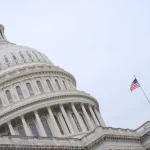

A spy balloon floated over most of the continental United States. A Chinese government-linked corporation purchased a plot of land near a sensitive military base.
The recent brushes with China have crystallized a challenge for lawmakers and defense experts that has long sat in the shadows — Beijing’s steadily increasing share of U.S. land poses a serious “national security threat.”
WHO OWNS AMERICA? SHORTCOMINGS IN CHINESE FOREIGN OWNERSHIP DATA
While China is known to own just a fraction of American agricultural land — a little less than 1% of all foreign-held land, according to the Department of Agriculture — its investment in agricultural holdings has increased dramatically in recent years. Chinese investorsowned just 69,295 acres of American land at the end of 2011, according to the USDA, but by the end of 2021, Chinese investorscontrolled 383,935 acres.
A local city council finallyrejecting the Chinese government-linked Fufeng Group’s plans for a site very close to Grand Forks Air Force Base in North Dakota helped highlight the issue, but the episode also revealed the federal government’s apparent hesitance to act.
“Allowing Chinese companies with connections to the party-state to buy strategically important land in the United States is a national security threat,” Sen. Marco Rubio (F-FL), vice chairman of the Senate Intelligence Committee, told the Washington Examiner. “We need to treat the Chinese Communist Party for what it is — our greatest adversary.”
The impetus
The Chinese military-linked spy balloon saga seems to have reinforced efforts by U.S. legislators to ban China from purchasing U.S. farmland. The surveillance airshipcrossed the U.S. and floated over U.S. military installations before a U.S. fighter jet shot it down off the coast of South Carolina in early February.
Lawmakers from both parties have had more frequent and aggressive conversations about countering the threat of China ever since. However, even before the spy balloon saga, Chinese land purchases near U.S. military bases in Texas and North Dakota raised alarm bells.
Chinese nationals, including Chinese state-owned companies and people linked to Beijing’s government, have alsoincreased their efforts to scoop up U.S. farmland and real estate in recent years, leading to national security concerns, especially when the land has beenseemingly strategically purchased right near key U.S. military bases.
Beginning in 2016, Chinese real estate tycoon Sun Guangxin spent tens of millions of dollarsbuying up at least 140,000 acres of land in Texas near Del Rio, conveniently near Laughlin Air Force Base, which trains U.S. military pilots. Sun said he planned to use an American subsidiary to build a wind farm, but state and national leaders from Texas sought to shut the project down over security concerns. The tycoon is a former captain in thePeople’s Liberation Army and has known close links to the Chinese Communist Party.
Similarly, Fufeng Group, a huge agricultural company with significant links to China’s government, purchased 370 acres as a location for its new wet corn mill in the agribusiness park just a short distance from Grand Forks Air Force Base in North Dakota. That base is home to sensitive air and space operations.
After months of consideration, the Committee on Foreign Investment in the United States, or CFIUS, declined to block the projectdespite urging from North Dakota’s Republican senators and other congressional Republicans on Capitol Hill. The U.S. Air Force warned of the significant national security threat, and the Grand Forks City Councilvoted to end the project in February — only after CFIUS refused to act.
National security threat
The USDAsaid in 2018 that “the incorporation of agricultural investment into broader geopolitical objectives is reflected by the prominence” of the Chinese government’s “One Belt One Road” initiative.
That Chinese initiative is designed “to expand China’s global economic reach and influence,” the Congressional Research Servicesaid in December. The One Belt One Road initiative includes overseas investments in energy, transportation, and telecommunications technology, among many other areas.
Some members of Congress have focused specifically on the agricultural investments.
Last year, House Republicans repeatedly urged the Biden administration toinvestigate the “national security threat” posed by China grabbing up American farmland. Lawmakers have also called on Agriculture Secretary Tom Vilsack to do more about the problem.
The U.S.-China Economic and Security Review Commissionsaid last year that “foreign-owned land near military installations may require additional monitoring” and warned that “as more Chinese investors purchase land, including for agricultural use, CFIUS has an opportunity to safeguard vital military assets.”
“We’ve witnessed espionage and other malign activity when the Chinese Communist Party is allowed to purchase land by U.S. military bases,” Rep. Michael McCaul (R-TX), chairman of the House Foreign Affairs Committee, told the Washington Examiner. “This is very concerning, and all national security agencies should have voice and authority to make sure these purchases are not slipping through the cracks.”
Grand Forks case study
A small city in North Dakota rejected aChinese government-linkedagricultural project located right near a key U.S. military drone base in February after CFIUSrefused to act.
After months of consideration, CFIUS declined to block the projectdespite urging from North Dakota’s Republican senators and other congressional Republicans, but the Grand Forks City Council stepped in tounanimously block the Fufeng project from moving forward.
Concerns over the Chinese land buy came as Sens. Rubio, Kevin Cramer (R-ND), and John Hoeven (R-ND) sent aletter to Defense Secretary Lloyd Austin and Treasury Secretary Janet Yellen early last year asking CFIUS to “conduct a review of Chinese food manufacturer Fufeng Group’s recent purchase.” The senators said the proximity of the land to the base “led to concern that Fufeng operations could provide cover for [People’s Republic of China] surveillance.”
When the Grand Forks sale was first announced last year, Gov. Doug Burgum (R-ND) initiallytold the Grand Forks Herald that “with Fufeng in Grand Forks, it will be North Dakota — not China — that reaps the benefits.”
But the U.S.-China Economic and Security Review Commission quicklywarned thatFufeng has “ties” to the Chinese government and the Chinese Communist Party. The security commission noted that “the location of the land close to the base is particularly convenient for monitoring air traffic flows in and out of the base, among other security-related concerns.”
Fufengbusiness filingsstate that Fufeng Group Chairman Li Xuechun “is a member of the Shandong Province 12th People’s Congress,” which is a part of the ruling CCP’s governing structure.
Although CFIUS declined to block the sale, the Pentagon raised strong objections. Air Force Maj. Jeremy Fox penned a 2022memo stating that Fufeng could “present a costly national security risk causing grave damage to [the] United States’ strategic advantages.”
Assistant Secretary of the Air Force Andrew Hunter finally sent a Januaryletter to Hoeven noting that “while CIFIUS concluded that it did not have jurisdiction, the Air Force’s view is unambiguous: the proposed project presents a significant threat to national security.”
CLICK HERE TO READ MORE FROM THE WASHINGTON EXAMINER
Grand Forks Mayor Brandon Bochenskiadded in January that “the response from the Federal Government during this process can only be viewed as slow and contradictory.”
The Grand Forks City Council met in early February, and after hearing lengthy comments from the public and from other city officials who almost universally opposed the project, the town leadersunanimously voted to block the Chinese project from moving forward.





